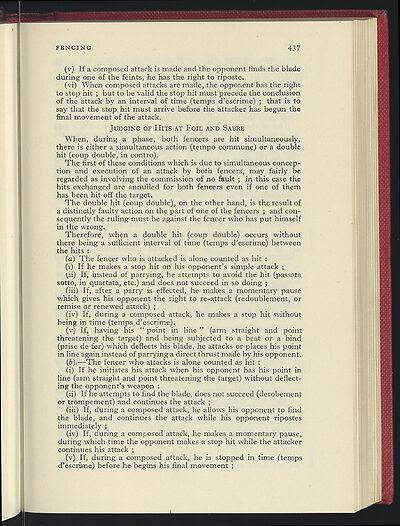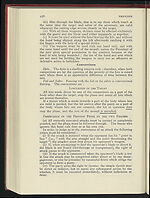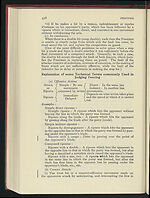1957-58
(455)
Download files
Complete book:
Individual page:
Thumbnail gallery: Grid view | List view

«.
FENCING
1
437
(v) If a composed attack is made and the opponent finds the blade
during one of the feints, he has the right to riposte.
(vi) When composed attacks are made, the opponent has the right
to stop hit ; but to be valid the stop hit must precede the conclusion
of the attack by an interval of time (temps d'escrime) ; that is to
say that the stop hit must arrive before the attacker has begun the
final movement of the attack.
JUDGING OF HITS AT FOIL AND SABRE
When, during a phase, both fencers are hit simultaneously,
there is either a simultaneous action (tempo commune) or a doubly,
hit (coup double, in contro).
The first of these conditions which is due to simultaneous concep-
tion and execution of an attack by both fencers, may fairly be
regarded as involving the commission of no fault ; in this case the
hits exchanged are annulled for both fencers even if one of them
has been hit off the target.
The double hit (coup double), on the other hand, is the result of
a distinctly faulty action on the part of one of the fencers ; and con-
sequently the ruling must be against the fencer who has put himself
in the wrong.
Therefore, when a double hit (coup double) occurs without
there being a sufficient interval of time (temps d'escrime) between
the hits :
(a) The fencer who is attacked is alone counted as hit
(i) If he makes a stop hit on his opponent's simple attack ;
kii) If, instead of parrying, he attempts to avoid the hit (passata
sotto, in quartata, etc.) and does not succeed in so doing ;
(iii) If, after a parry'is effected, he makes a momentary pause
which gives his opponent the right to re-attack (redoublement, or
remise or renewed attack) ;
(iv) If, during a composed attack, he makes a stop hit without
being in time (temps d'escrime).
(v) If, having his "f point in line " (arm straight and point
threatening the target) and being subjected to a beat or a bind
(prise de fer) which deflects his blade, he attacks or places his point
in line again instead of parrying a direct thrust made by his opponent.
(b).--The fencer who attacks is alone counted as hit :
(i) If he initiates his attack when his opponent has his point in
line (arm straight and point threatening the target) without deflect-
ing the opponent's weapon :
(ii) If he attempts to find the blade, does not succeed (derobement
or trompement) and continues the attack ;
(iii) If, during a composed attack, he allows his opponent to find
the blade, and continues the attack while his opponent ripostes
immediately ;
(iv) If, during a composed attack, he makes a momentary pause,
during which time the opponent makes a stop hit while the attacker
continues his attack ;
(v) If, during a composed attack, he is stopped in time (temps
d'escriine) before he begins his final movement ;
E
A
,
�1
FENCING
1
437
(v) If a composed attack is made and the opponent finds the blade
during one of the feints, he has the right to riposte.
(vi) When composed attacks are made, the opponent has the right
to stop hit ; but to be valid the stop hit must precede the conclusion
of the attack by an interval of time (temps d'escrime) ; that is to
say that the stop hit must arrive before the attacker has begun the
final movement of the attack.
JUDGING OF HITS AT FOIL AND SABRE
When, during a phase, both fencers are hit simultaneously,
there is either a simultaneous action (tempo commune) or a doubly,
hit (coup double, in contro).
The first of these conditions which is due to simultaneous concep-
tion and execution of an attack by both fencers, may fairly be
regarded as involving the commission of no fault ; in this case the
hits exchanged are annulled for both fencers even if one of them
has been hit off the target.
The double hit (coup double), on the other hand, is the result of
a distinctly faulty action on the part of one of the fencers ; and con-
sequently the ruling must be against the fencer who has put himself
in the wrong.
Therefore, when a double hit (coup double) occurs without
there being a sufficient interval of time (temps d'escrime) between
the hits :
(a) The fencer who is attacked is alone counted as hit
(i) If he makes a stop hit on his opponent's simple attack ;
kii) If, instead of parrying, he attempts to avoid the hit (passata
sotto, in quartata, etc.) and does not succeed in so doing ;
(iii) If, after a parry'is effected, he makes a momentary pause
which gives his opponent the right to re-attack (redoublement, or
remise or renewed attack) ;
(iv) If, during a composed attack, he makes a stop hit without
being in time (temps d'escrime).
(v) If, having his "f point in line " (arm straight and point
threatening the target) and being subjected to a beat or a bind
(prise de fer) which deflects his blade, he attacks or places his point
in line again instead of parrying a direct thrust made by his opponent.
(b).--The fencer who attacks is alone counted as hit :
(i) If he initiates his attack when his opponent has his point in
line (arm straight and point threatening the target) without deflect-
ing the opponent's weapon :
(ii) If he attempts to find the blade, does not succeed (derobement
or trompement) and continues the attack ;
(iii) If, during a composed attack, he allows his opponent to find
the blade, and continues the attack while his opponent ripostes
immediately ;
(iv) If, during a composed attack, he makes a momentary pause,
during which time the opponent makes a stop hit while the attacker
continues his attack ;
(v) If, during a composed attack, he is stopped in time (temps
d'escriine) before he begins his final movement ;
E
A
,
�1
Set display mode to:
![]() Universal Viewer |
Universal Viewer | ![]() Mirador |
Large image | Transcription
Mirador |
Large image | Transcription
| Games and sports in the army > 1957-58 > (455) |
|---|
| Permanent URL | https://digital.nls.uk/248856912 |
|---|
| Description | 'Games and Sports in the Army' was an annual publication produced by the British War Office between the 1930s and 1960s. This included the Second World War. It outlines the rules and regulations for games and sports played by members of the armed forces. It features names and photographs of team members, and examples of contemporary advertising. |
|---|---|
| Shelfmark | GWB.52 |

